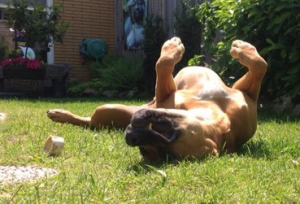He’s sweet, but he’s just not good with other dogs
That used to be the description I gave to people when it came to our 3-year-old dog Baloo.
My wife and I both have a lot of experience with big dogs. I grew up with two Dobermann, and she owned a Rottweiler when we met. So while dogs are still animals and the teeth occasionally come out, neither of us feared those moments and knew how to handle them. But Baloo is different. Despite puppy training and additional guidance, at some point we realized that we could not predict his behavior with other dogs and trust was lost. He stays on the leash at all times when we’re outside.

When a dog is aggressive towards almost every other dog you meet, that has a greater impact on your day-to-day life than you realize. Like finding a kennel when you want to go on holiday, and not stressing out all the time if something bad has happened. Or asking someone else to walk him, when you want to go to a theme-park for an entire day. Or having our young kids bring friends over to play after school.
Or even something as simple as where, when and how you walk the dog. I started taking the less-used routes. I started to walk on less-popular hours. And most importantly, I started to avoid other dogs completely – crossing the street whenever I encountered one.
And I would say “he’s sweet, but he’s just not good with other dogs”…
When you feel your world and your options getting smaller and smaller, something is wrong. And both my wife and I experienced less joy from being dog owners than we would like to. So we decided to change what was happening. The simplest thing we changed, that had the most surprising effect on our daily lives, was the way we talked about the incidents.
So Baloo is now a dog still learning how to behave with other dogs, and whenever something happens, it’s a learning moment.
Where before we would say “he tried to attack another one today” or “he really can’t stand that beagle on the corner”, we would now say “I had another opportunity to correct him today”, or “I got really close to the beagle, and while his hair was standing up, he did not try to lunge this time”.
And the weirdest thing happened. In a few days time, I realized I was actively seeking out other dogs on the street. Not because everything was going so well, his behavior really didn’t change much in that short period of time (didn’t I mention this is not a success story? Sorry about that…). But because I wanted to have more “learning moments”. The dread of having to explain my dogs behavior made place for optimism in explaining he was still learning and that the incident was actually helping him get better.

We’ve noticed changes in others as well. The neighbor from across the street has a lovely dog that reacted to Baloo quite strongly, and got a strong reaction back. We’ve gotten to the point where they can both walk down the street without acknowledging each other, which is a great victory. But our change in attitude (and language) brought some confidence to our neighbor as well. He expected positive change because we allowed the option of improvement in our description of the situation.
You see “he’s just not good with other dogs” is a definitive statement. It places no responsibility on the issuer of the statement (me) and leaves no possibility of change. So just by changing the vocabulary used to describe a situation, we have changed our own experience of the same situation. I’ve always been a fan of ways to trick the mind. For example, you can improve your share of happy thoughts by sitting up straight.
Now I know this is just a story about some guy and his dog. But I think I’ve learned a few things that might come in handy at work:
Change the tone
Recognize definitive language (from you as well as others) and gently replace it with alternatives that leave options of success open. A client might come in with last-minute changes and the response could be “Wow, they never learn”. But perhaps “they repeated an earlier mistake” would be better. I don’t know about you, but my mind sees the second version as a fixable problem and tries to find solutions.
Celebrate small improvements
I also found that new descriptions left room to celebrate even the smallest improvement. “I had to correct Baloo, but he shook off the aggression faster than before” is not something I would have even mentioned (or noticed?) if it was just another incident. But now, those small improvements where noticed, shared between us and grew to become bigger victories. The same goes in a team. Don’t save the celebrations for the large accomplishments, but make small goals explicit and enjoy the moment that it happens. Especially in a large legacy big-ball-of-mud project those small victories start to add up to a general feeling of progress within a team.
You have the power!
Most importantly, I realized that your language is always within your own power to change. So even if you feel like there is nothing you can do, you can do something. Namely, describing the situation in a way that leaves the option for success open.
Because if the shape of your body can unconsciously influence the mind, the shape of your language might do the same, right?
